O equilíbrio entre gestão de pessoas, inovação e o futuro do trabalho para o crescimento das empresas

Em 2021, a sociedade e principalmente os gestores de empresas se prepararam para a retomada da atividade econômica após o início da vacinação no Brasil contra a pandemia de covid-19. Novos processos de trabalho e a reestruturação das instituições foram a meta de gestão, mas foi essencial adequar os processos para cuidar do mais importante: as pessoas. Depois de um ano inteiro de transformações, discussões, dúvidas e necessidades para as organizações e para as lideranças, a sociedade desenha o futuro do trabalho e suas soluções. Na 4a edição da pesquisa de Tendências de Gestão de Pessoas, realizada pelo Great Place to Work, a pandemia deixou quatro importantes legados para a Gestão de Pessoas: a qualificação das lideranças, que assume o protagonismo nas prioridades das empresas; o redesenho das instituições, com a adesão de novos formatos ou jornadas de trabalho, que provocaram mudanças na concessão de benefícios aos funcionários; o foco na saúde mental, não somente em ambientes corporativos, mas como um todo; e a valorização da comunicação interna das organizações.
Observando o resultado apresentado na pesquisa, vimos durante todo o ano de 2022 uma mudança no comportamento das empresas e de seus gestores. A maior mudança foi no investimento em desenvolvimento e capacitação das lideranças, para garantir a construção de ambientes de trabalho emocionalmente saudáveis e para o alcance de resultados estratégicos. Entre as características mais valorizadas nas lideranças aparecem “resiliência”, “alinhamento com a estratégia” e “empatia e gestão humanizada’’. No entanto, o mercado busca pessoas com competências em campos muito diversificados, mostrando a complexidade dos tempos atuais e das demandas organizacionais. Um fato curioso nos leva a avaliar o cenário de inovação das empresas; de acordo com a pesquisa, o principal empecilho para a inovação nas instituições foi a “mentalidade da liderança”. Ou seja, pelo que tudo indica, ainda há uma discrepância entre a liderança necessária para o futuro e a liderança existente. Essa comprovação, de que há um caminho a ser percorrido pelas lideranças, também apareceu na recente pesquisa desenvolvida em parceria com a FGV-EAESP, Grupo Stefanini, Talenses Group e MIT Sloan Review Brasil. O estudo denominado “Dicotomias no Futuro do Trabalho: Entenda como os gestores podem tomar decisões sobre os modelos a adotar em meio a tantas incertezas” avalia os diferentes graus de concordância das pessoas em relação a temas que permeiam o futuro do trabalho. Os pesquisadores entrevistaram 508 profissionais de todo o país sobre 33 mudanças que vêm sendo apresentadas pelos estudiosos como os prováveis parâmetros do trabalho no futuro. Essas alterações se dividem em quatro pilares: Natureza do Trabalho, Força do Trabalho, Execução do Trabalho e Educação para o Trabalho. O objetivo foi entender quais dessas mudanças já obtêm grande concordância, quais geram grande discordância e quais são consideradas ainda indefinidas, algo em aberto.
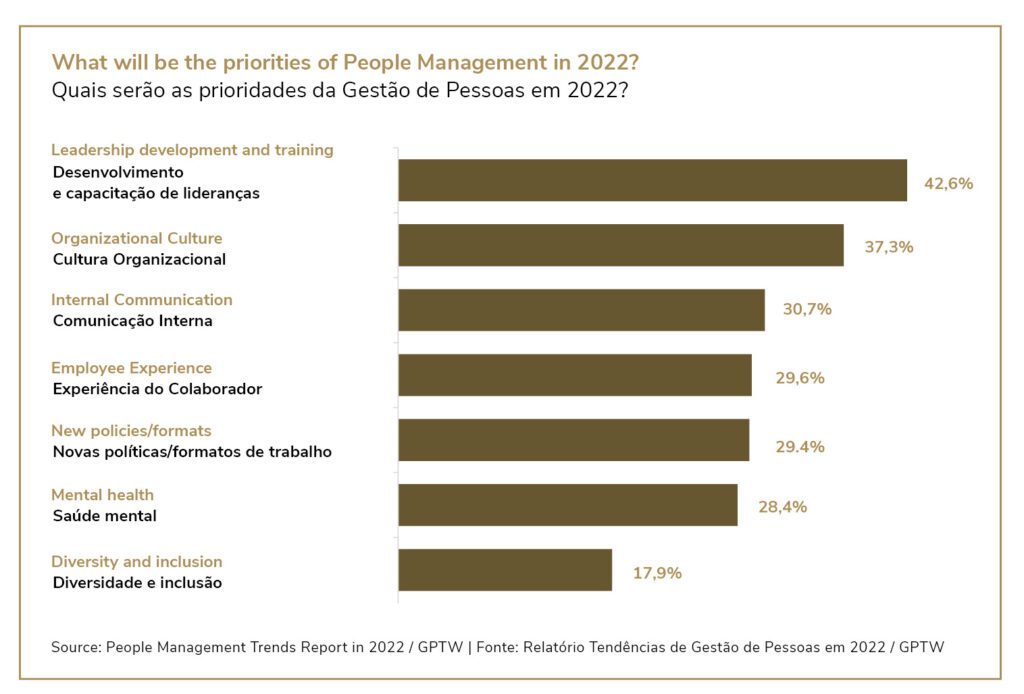
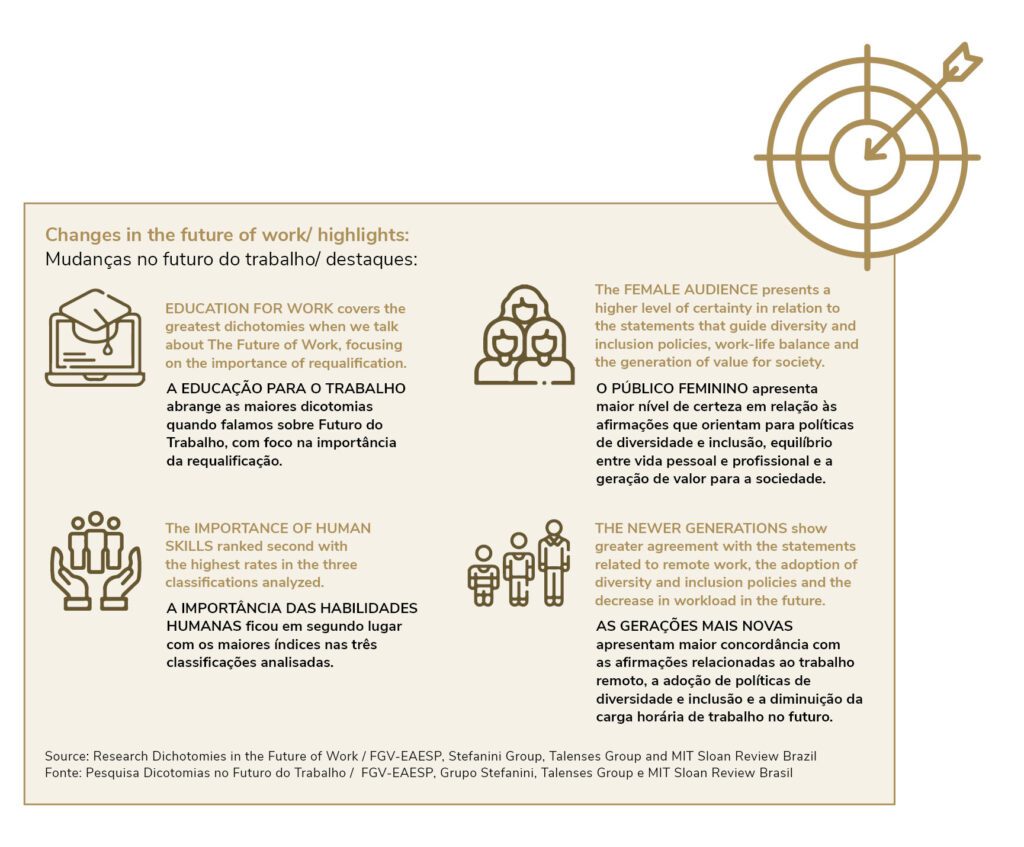
“Medimos o grau de concordância com notas de 0 a 10 em ordem crescente e mensuramos também a consistência das respostas por um percentual de desvio-padrão. E foi assim que descobrimos fortes dicotomias. A existência de divergências, especialmente entre executivos de uma mesma organização, exige um olhar mais atento sobre o alinhamento interno e a identificação clara das áreas problemáticas para minimizar o “noise” (segundo conceito definido por Daniel Kahneman) e garantir que as decisões de alocações de recursos tenham o máximo impacto nos resultados de negócios”, explica Paul Ferreira, professor de Estratégia e Liderança da FGV-EAESP e responsável pela pesquisa e pela metodologia.
Entre os principais achados da pesquisa, estão 13 afirmações que indicam mudanças que com certeza irão acontecer, caracterizadas por uma homogeneidade na concordância entre os respondentes. Entre elas estão: “trabalhos que exigem criatividade e inovação serão altamente valorizados e bem remunerados”; “haverá grandes mudanças nas relações de trabalho contratuais em direção a contratos temporários e flexíveis”; “as inovações tecnológicas irão exigir uma constante requalificação da força de trabalho”; e “o modelo ‘work from anywhere’ terá grande relevância nos motivos para os trabalhadores aceitarem uma proposta de trabalho”. “Importante frisar que o debate sobre o futuro do trabalho é, essencialmente, um debate sobre o futuro da sociedade e discutir amplamente esse tema se torna indispensável”, defende Marcelo Ciasca, CEO da Stefanini Brasil.
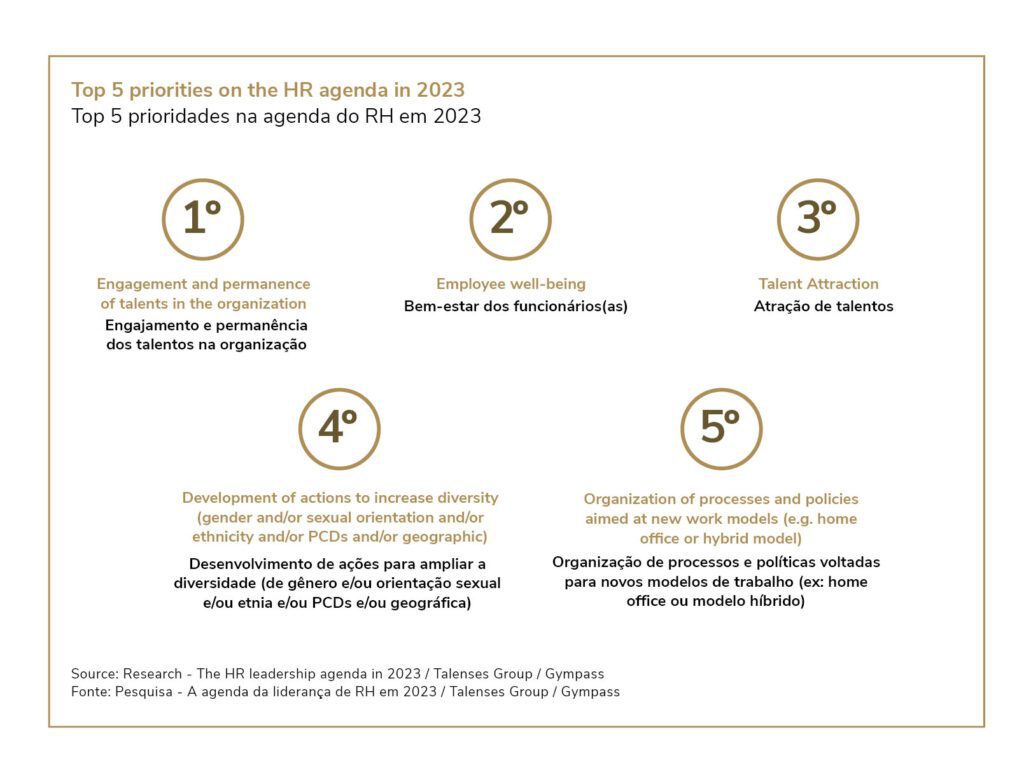
O estudo da FGV-EAESP reforça o que a pesquisa da Great Place to Work havia apontado e mostra que outro fator valorizado no desenvolvimento de pessoas e empresas é a comunicação. A adoção dos formatos híbrido, remoto e flexível continua sendo um grande desafio para as instituições, que precisam encontrar as tecnologias adequadas para manter o fluxo de informações e encontrar os processos ideais para que todas as pessoas da equipe se sintam igualmente contempladas na troca de informações corporativas. Dessa forma, podem garantir o alinhamento, o senso de pertencimento e a manutenção da cultura organizacional entre todos.
Destaca-se que a saúde mental e o bem-estar ganham cada vez mais espaço no modelo de sucesso de várias empresas, independentemente de seu tamanho. Elas têm como desafio constante encontrar novas formas de oferecer benefícios de saúde mental para colaboradores. O tema é tão importante que a 26ª edição do ranking das “150 Melhores Empresas para Trabalhar no Brasil” do GPTW, anunciado no último dia 17 de outubro, introduziu o “Destaque Saúde Emocional”, que reconheceu 15 empresas que se sobressaíram pelos ótimos índices relacionados à saúde e bem-estar de seus líderes e colaboradores. Dentre os vencedores estão Mercado Livre, Viacredi e Salesforce e Teltec. O estudo realizado com as 150 melhores mostra que as empresas vêm amadurecendo cada vez mais na sua gestão de pessoas especialmente em temas como saúde e diversidade que vem crescendo tanto na estratégia quanto nas ações das empresas. 90% das premiadas indicaram que adotaram práticas relacionadas ao tema nos últimos 20 meses.
Em relação ao modelo de trabalho, a dinâmica contemporânea do mundo profissional já é uma realidade: 87% das empresas premiadas indicaram que dispõem de horário flexível para funcionários(as) na organização; 77% das empresas indicaram que possuem horário híbrido, sendo que 62% destas empresas sinalizou que mais de 50% dos(as) funcionários(as) são elegíveis a prática. Já na pesquisa inédita da Talenses Group, as empresas alegaram o seguinte: 62% têm programa de bem-estar, 92% têm programa com ações internas de bem-estar, como palestras e conteúdo, 40% têm benefícios flexíveis. Entre as prioridades delas, o bem-estar aparece com 63%, empatado com o aumento de lucro. Isso mostra que investir em pessoas e o desenvolvimento socioemocional de colaboradores, gestores e lideranças fazem parte da nova agenda das empresas e de seus planos de crescimento.
De acordo com Luiz Valente, CEO do Talenses Group, “discutir o amanhã do futuro do trabalho é altamente relevante neste momento Este tema se ramifica em todas as áreas do mundo corporativo, indo desde os processos e a cultura que as organizações precisam cultivar para não morrerem em um mundo em transformação, até as habilidades que os profissionais precisarão começar a desenvolver hoje para continuar a serem relevantes amanhã”.
Contudo, é preciso lembrar que esse cenário precisa envolver políticas de diversidade e inclusão. Na pesquisa da GPTW, embora a maioria afirme que essa é uma pauta estratégica em sua organização, somente 12,2% respondem que a empresa em que atuam tem maturidade no tema e contribui, de fato, para uma equidade de gênero, racial, geracional, do público LGBTQI+Q e outras minorias. Segundo a pesquisa, o grupo que recebe menos atenção é o de pessoas 50+. Esse dado fica ainda mais evidente quando somado à avaliação dos dados da pesquisa do GPTW, que dá origem ao ranking das Melhores Empresas para Trabalhar no Brasil: apesar de 93% das empresas contarem com alguém responsável por combater a discriminação e promover a diversidade, o menor avanço do tema está no geracional: apenas 3% a 4% da força de trabalho está no 55+ e 12% entre 45 a 55 anos.
“Podemos dizer que o ano passado foi de reestruturação para a maioria das empresas, que precisaram entender como poderiam se adaptar aos novos cenários e adequar seus processos para cuidar do mais importante: as pessoas. O desafio agora é manter todos os colaboradores focados na missão e nos valores de cada empresa em ambientes diversos, com múltiplos pontos de contato e, muitas vezes, tendo que recorrer à comunicação assíncrona. O mundo corporativo está se empenhando em responder essas questões, após experimentações desafiadoras, mas transformadoras e essenciais para o futuro do trabalho”, conclui Ruy Shiozawa, Co-founder e ex CEO do Great Place To Work Brasil.
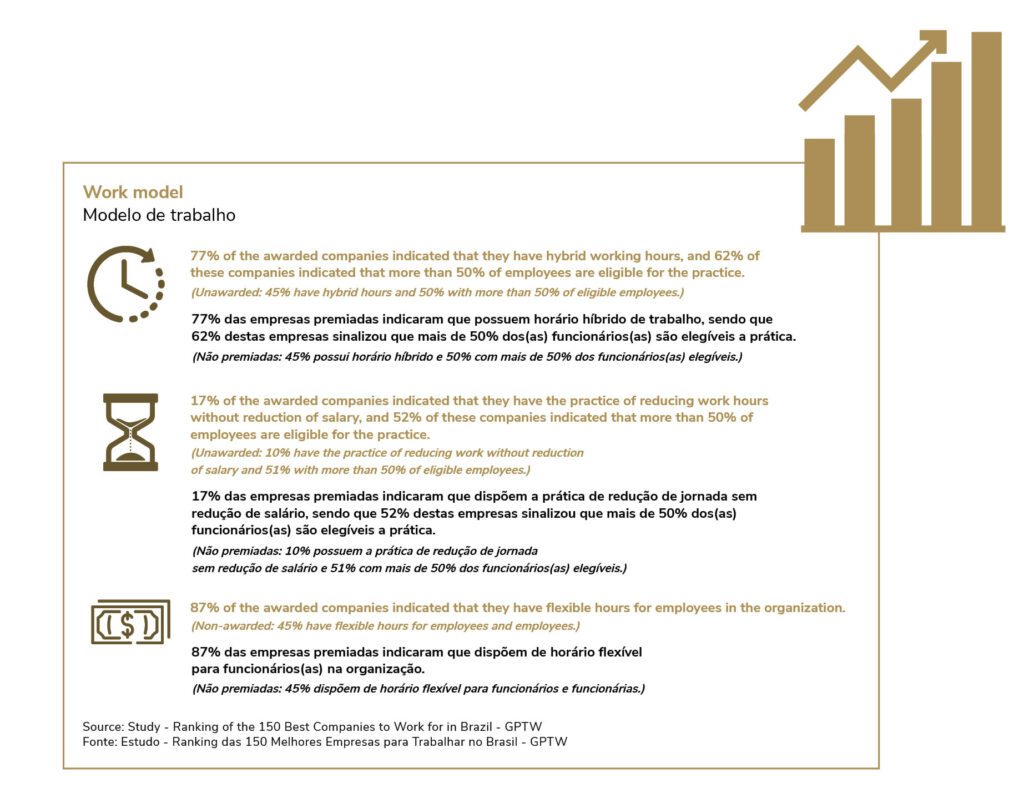
Com esse cenário já é possível encontrar bons exemplos de mudança de gestão que tem como retorno o aumento de receita, e comprova que investir em pessoas pode dar lucro. Esse é o caso do Grupo Linear, pioneira em desenvolvimento de escoamento no país, desde fevereiro de 2022 aderiu ao programa Parceiros para a Excelência (Paex), disponibilizado pela Fundação Dom Cabral (FDC), sendo representada em Santa Catarina pela Fritz Müller – Hub de Conhecimento. Segundo Roni Branco, diretor comercial da corporação, essa ação tem sido uma forma de potencializar resultados de um modelo de gestão que alinha propósito, estratégia, inovação e impacto social. A empresa já está na fase de mentorias, iniciando o processo de reuniões de Avaliações Gerenciais Mensais. “É um investimento que está levando o Grupo Linear a uma nova visão de estrutura gerencial, um novo jeito de encarar o mercado e que vai aumentar o patamar de competitividade da empresa”, destaca Roni. Desde o ingresso no programa os resultados já são visíveis: a receita de 2022 já tem um crescimento acumulado de 30,4%, de janeiro a setembro.
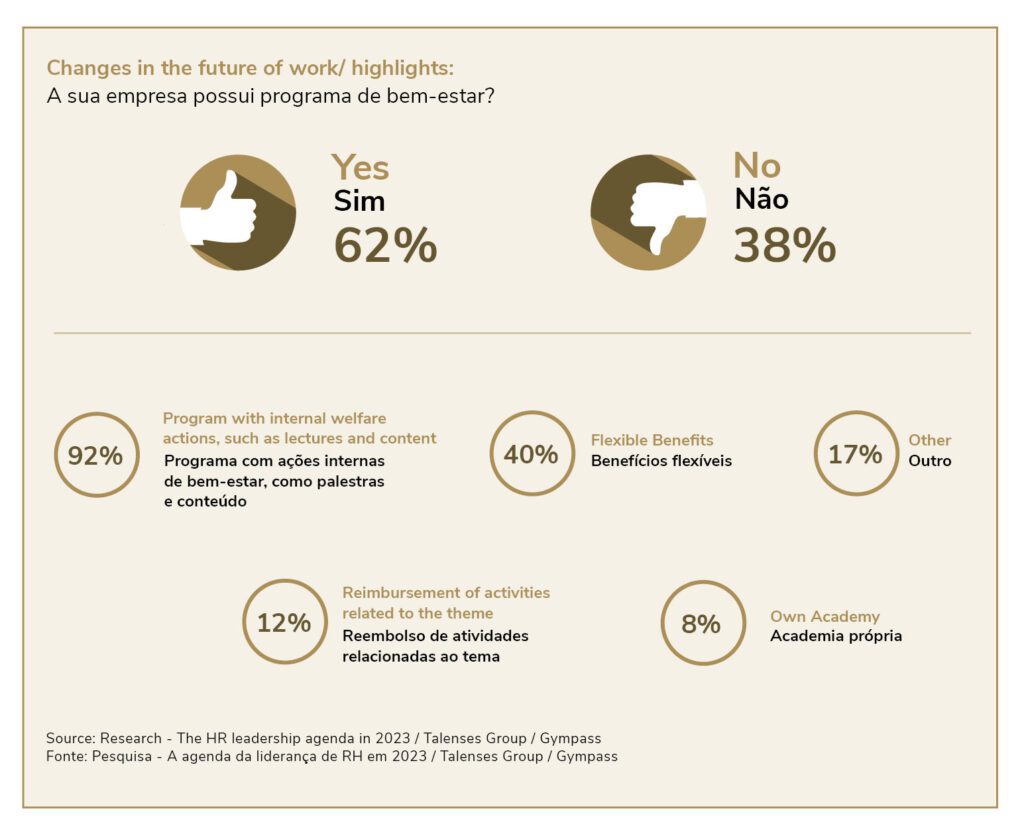
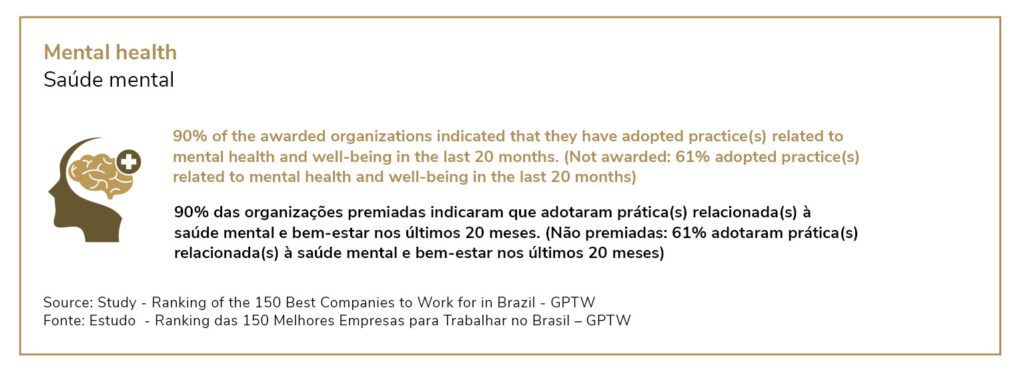
Ouvir os colabores também foi uma lição aprendida e segue nos mapas de gestão das lideranças. No NANNAI Resort & Spa, grupo hoteleiro de Pernambuco, a criação de um novo departamento GET (Gestão Estratégica de Talentos) possibilitou a abertura de um espaço para ouvir os colaboradores. Eles foram encorajados a levar aos gestores as questões importantes para que seus anseios pudessem ser solucionados. Desse modo, foram mapeados 400 colaboradores dos dois hotéis do NANNAI Spa&Resort – Muro Alto e Fernando de Noronha, e foi possível fazer a relação vaga/cargo e perfil comportamental, avaliar o desempenho com algoritmos e histórico para acompanhar os PDIs de cada colaborador. Com uma triagem mais aprofundada para a retenção dos talentos, evitaram-se erros de contratação e promoveu-se a redução de turn over, movimentando as pessoas para o “palco correto”, melhorando seu desempenho. “Tínhamos a meta de reduzir o turnover do nosso pessoal de 3,4 para 1,6%. E aí, o caminho óbvio. Era a estratégia focada justamente nelas, as pessoas! Ao oferecer a elas benefícios e cuidados que entendemos ser os mesmos que gostamos de receber, a conta fechou”, reforça Paulo Amaral, gerente-geral dos hotéis.
As mudanças no ambiente de trabalho estão apenas começando, há muito caminho a ser percorrido, mas uma coisa é unânime entre os especialistas: o futuro das empresas depende de pessoas, e elas devem receber incentivo e investimento. Assim, todos crescem e naturalmente são promovidos o engajamento e a permanência dos talentos na organização, que darão frutos positivos na expansão de mercado e geração de lucro. As empresas que não dirigirem seus esforços para melhorar o ambiente de trabalho e oferecer experiências realmente positivas para as pessoas perderão espaço no mercado.
Fontes: Pesquisa – A agenda da liderança de RH em 2023 / Talenses Group / Gympass
Estudo – Ranking das 150 Melhores Empresas para Trabalhar no Brasil – GPTW
Pesquisa Dicotomias no Futuro do Trabalho / FGV-EAESP, Grupo Stefanini, Talenses Group e MIT Sloan Review Brasil
Relatório Tendencias de Gestão de Pessoas em 2022 / GPTW
